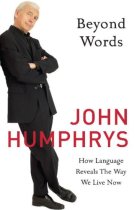 On this site, book reviews are much like buses. You wait six months for one, and then two come along at once. They both eventually get where they’re going, but not without a few uncomfortable bumps and scrapes along the way, which stop the passengers relaxing.
On this site, book reviews are much like buses. You wait six months for one, and then two come along at once. They both eventually get where they’re going, but not without a few uncomfortable bumps and scrapes along the way, which stop the passengers relaxing.
Today, it’s the turn of John Humphrys’ Beyond Words. This is subtitled ‘How Language Reveals The Way We Live Now’. I propose that this subtitle was not submitted by Mr Humphrys himself, thanks to two clues: Firstly, I Don’t Think He’d Approve Of Capitalisation Of The First Letter Of Every Word. In fact, he rails against it in the book. Secondly, his narrative does not address ‘how language reveals the way we live now’. Not really. A much better summary is given by the blurb: “What are the words and expressions that irk, intrigue and provoke John Humphrys?”.
At this point, I should declare an interest. John Humphrys has, over the past four years or so, had the Herculean task of waking me most mornings. His voice, as presenter of Today, has permeated its way into my semi-conscious mind hundreds of times; and when someone’s voice has woken you that often, you feel you know them, and you feel they are your friend. Therefore, provided Mr Humphrys’ book was marginally better than The Da Vinci Code, I was bound to like it.
And like it I do. It’s something of a jolly romp through modern day language. It’s entertaining, it’s engaging, and it makes some interesting points about the development of language. I would say that it follows on perfectly from his previous book, Lost for Words, but I’ve not read it, so I’ve really no idea whether it does or not. But I can say that, as a result of reading this book, I’ll be looking out for that one.
In contrast to Lynne Truss, who, apparently without irony, lamented the decline of formal English in an unnecessarily conversational grammar guide (Eats, Shoots and Leaves), John Humphrys takes a more reflective and analytical approach to changes in language. His tone is equally conversational and humour-laced, but without the continual condemnation of Truss.
Humphrys’ is a clear, easy book to read. Perhaps it’s the way his voice is imprinted on my brain, but his book reads almost as if one is in the room with him, and listening to a well-argued, highly entertaining monologue. And, unlike some authors, Humphrys is not trying to argue that misplaced apostrophes are the cause of social decline: He takes a reasoned approach to his arguments, which makes his conclusions seem all the more valid.
All-in-all, Beyond Words is a great read, and I’d highly recommend it to anyone with even a passing interest in the English language.
Beyond Words by John Humphrys is available now in the sjhoward.co.uk shop.


